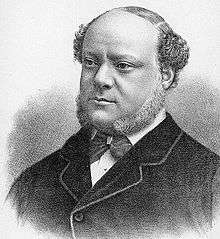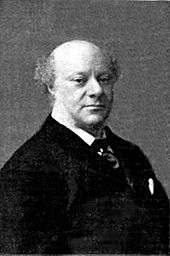Alberto Randegger

Alberto Randegger (13 April 1832 – 18 December 1911) was an Italian-born composer, conductor and singing teacher, best known for promoting opera and new works of British music in England during the Victorian era and for his widely used textbook on singing technique.
Life and career
Randegger was born in Trieste, Italy, the son of musician mother and schoolteacher father. He met Giuseppe Verdi in Trieste, in 1850, and later became known as a great interpreter of Verdi's operas.[1] He was a pupil of Jean Lafont in piano and of Luigi Ricci in composition.
Early career
His earliest compositions were masses and other pieces of church music and, with two other young pupils of Ricci, produced two ballets and an opera, Il Lazzarone, in 1852. In 1854 he composed another opera, Bianca Capello, at Brescia. During this period, he also served as music director of theatres in Fiume, Senigallia, Brescia and Venice.[2]
Randegger began work in London as an organist at St. Paul's in Regent's Park from his arrival there, in 1854, until 1879. Beginning in 1857, he conducted Italian opera at the St. James's Theatre. He also became well known as a teacher of singing in London, both privately and at the Royal College of Music. Beginning in 1868, he was conductor at the Wolverhampton Festival. The same year, he was appointed professor of singing at the Royal Academy of Music, where he was appointed a director and a member of the committee of management. He continued teaching at both the College and the Academy until his death.[2] His notable pupils included sopranos Liza Lehmann,[3] Greta Williams[4] and Ellen Beach Yaw;[5] mezzo-soprano Mary Davies;[6] tenors William Hayman Cummings and Ben Davies;[7] baritones Charles W. Clark and Andrew Black;[8][9] and basses Darrell Fancourt,[10] Putnam Griswold,[11] William Howland[12] Frederick Ranalow and Robert Radford.[13] In 1882, Randegger was elected an honorary member of the Royal Philharmonic Society.
As a composer, in addition to his early works, Randegger wrote a comic opera, The Rival Beauties (1864); the vocal scenas Medea (1869); a musical play with dramatist W. S. Gilbert, Creatures of Impulse (1871); a dramatic cantata, the 150th Psalm for soprano solo, choir, orchestra, and organ (1872); Fridolin (1873); two scenes for soprano and orchestra, Medea (1869) and Sappho (1875); Funeral Anthem, in memory of the Prince Consort; The Prayer of Nature (1887); and numerous other vocal pieces. He also edited several collections of vocal music and collaborated with T. J. H. Marzials on the libretto for Arthur Goring Thomas's opera Esmeralda (1883).
Carl Rosa and later years

Randegger served as musical director of the Carl Rosa Opera Company from 1879 to 1885, helping to revive interest in opera in England. In 1880, George Grove wrote: "The careful way in which the pieces are put on the stage, the number of rehearsals, the eminence of the performers and the excellence of the performers have begun to bear their legitimate fruit, and the Carl Rosa Opera Company bids fair to become a permanent English institution."[14] Upon the resignation of Julius Benedict in 1881, he also became conductor of the Norwich Musical Festival, which he directed until 1905. There he conducted new works by Cowen, J. F. Barnett, Stanford, Alexander Mackenzie, Prout, Parry, Edward German and others, and at the 1905 Festival invited 14 British composers to conduct performances of their own works.[2] From 1885 to 1887, he also conducted Henry Leslie's Choir. He conducted the Queen's Hall Choral Society and the first two seasons of symphony concerts at Queen's Hall from 1895 to 1897.[2] Finally, from 1887 to 1898, he conducted at Theatre Royal, Drury Lane and at the Royal Opera House, where he became known for his performances of Wagner, Verdi and Mozart operas.
Randegger's most important legacy, outside of his conducting, was a textbook entitled Singing, published in 1879 by Novello & Co, which is still used.[15] In 1882, Randegger was elected an honorary member of the Royal Philharmonic Society.
Randegger was married first to the actress Adeline de Leuw whom he divorced in 1892 (and who later married Hayden Coffin), and on 11 March 1897 he married the American singer Louise Baldwin (her second marriage).[16]
Randegger died at his home in London at the age of 79.
Notes
- ↑ "Alberto Randegger". The Musical Times and Singing Class Circular, Vol. 40, No. 680, 1 October 1899, pp. 653-58
- 1 2 3 4 Grove, George, et al. "Alberto Randegger". Grove Music Online. Oxford Music Online. Retrieved on 16 June 2008. (subscription required)
- ↑ Baker, Theodore (1992), "Lehmann, Liza", in Slonimsky, Nicolas, Baker's Biographical Dictionary of Musicians, Eighth Edition, New York: Schirmer Books, pp. 1030–31, ISBN 0-02-872415-1
- ↑ Wyndham, Henry Saxe & L'Epine, Geoffrey (1915). Who's who in music: a biographical record of contemporary musicians (2nd ed.) New York: I. Pitman & Sons.
- ↑ Walters, Michael. "Madame Ellen Beach Yaw" in Daly's Issue, vol. 1, Gaiety Publications (2002), Ed. Roderick Murray, pp. 29-38.
- ↑ Artists appearing at the 1878 and 1879 Covent Garden Promenade Concerts
- ↑ A. Eaglefield-Hull, A Dictionary of Modern Music and Musicians (Dent, London 1924)
- ↑ John William Leonard, The book of Chicagoans: A biographical dictionary of leading living men and women of the city of Chicago, A.N. Marquis, 1917, p. 134
- ↑ Black Andrew; baritono. Operissimo concertissimo. March 19, 2016.
- ↑ The Musical Times, Vol. 52, No. 815, 1 January 1911, p. 29
- ↑ Putnam Griswold Archived July 16, 2011, at the Wayback Machine. at wotan.liu.edu
- ↑ William Stocking and Gordon K. Miller. "The city of Detroit, Michigan, 1701–1922, Vol. 5, pp. 562–63". Google Books.
- ↑ G. Davidson, Opera Biographies (Werner Laurie, London 1955), pp. 236–38. See: List of music students by teacher: R to S#Alberto Randegger.
- ↑ Information from the Carl Rosa history page
- ↑ Johnson, Keith (2006). "Alberto Randegger Biography". Allmusic. Retrieved 21 May 2008.
- ↑ NY Times article about Randegger's marriage to Baldwin, dated March 23, 1897
References
- Johnson, Keith (2006). "Alberto Randegger Biography". Allmusic. Retrieved 21 May 2008.
- 1911 encyclopedia profile
- Obituary: Alberto Randegger, Born April 13, 1832; Died December 18, 1911, The Musical Times, Vol. 53, No. 827, 1 January 1912, pp. 17–18
- Biography of Randegger in The Musical Times and Singing Class Circular, Vol. 40, No. 680, 1 October 1899, pp. 653–58
- Obituary, The Times, 19 December 1911
-
 This article incorporates text from a publication now in the public domain: Gilman, D. C.; Thurston, H. T.; Colby, F. M., eds. (1905). "article name needed". New International Encyclopedia (1st ed.). New York: Dodd, Mead.
This article incorporates text from a publication now in the public domain: Gilman, D. C.; Thurston, H. T.; Colby, F. M., eds. (1905). "article name needed". New International Encyclopedia (1st ed.). New York: Dodd, Mead.
External links
- 1880 drawing of Randegger
- Free scores by Alberto Randegger at the International Music Score Library Project